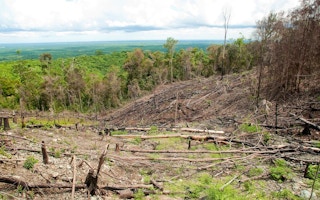Palm oil giant IOI Group is suing the Roundtable on Sustainable Palm Oil (RSPO) - an organisation it helped start - over its decision to suspend IOI’s membership on allegations that its subsidiaries flouted guidelines on responsible palm oil development.
To continue reading, subscribe to Eco‑Business.
There's something for everyone. We offer a range of subscription plans.
- Access our stories and receive our Insights Weekly newsletter with the free EB Member plan.
- Unlock unlimited access to our content and archive with EB Circle.
- Publish your content with EB Premium.
IOI, headquartered in Malaysia, said on Monday that it had recently filed the lawsuit in the Zurich District Court of Switzerland, where RSPO is seated.
The legal action comes after a decision made by RSPO on March 14 to suspend IOI’s membership and certification. The suspension became effective on April 4. It also means IOI can no longer sell its palm oil as “certified sustainable” under the RSPO trademark.
RSPO had acted on several complaints against IOI by green groups, which alleged that several IOI suppliers in Indonesia had failed to follow RSPO rules on not clearing forests with a high conservation value and developing plantations without proper government permits.
The non-profit, whose secretariat is based in Kuala Lumpur, Malaysia, issues certification for responsibly-grown palm oil. It also convenes a Complaints Panel, comprising representatives from non-government organisations and companies, which investigates claims of misconduct by its members.
Following the RSPO suspension, IOI - which helped set up RSPO in 2004 and has two representatives on its Board of Governors - lost several major clients including Unilever, Hershey’s, Colgate-Palmolive, Johnson & Johnson, and Procter and Gamble, among others. The suspension was also widely covered in local and international media.
The company’s chief executive officer, Lee Yeow Chor, said in a statement that the decision to legally challenge RSPO’s suspension “is a difficult and painful one for us to take”.
On one hand, IOI has a “great commitment and attachment” to RSPO, and has been contributing to the organisation for the past decade, said Lee. “On the other hand, we feel that we have been unfairly affected by the extent and scope of the suspension decision”, he added.
It has “caused significant disruption to certain segments of the European and American food manufacturing sector”, he noted. It had also affected the company’s 25,000 shareholders, the smallholder farmers in its supply chain, and other staff, he added.
While the company did not quantify the damages arising from the suspension, RSPO’s chief executive officer Darrell Webber, in a leaked memo obtained by The Guardian, said that IOI had complained to him that the firm had “suffered commercial and reputational losses as a result of this injustice”.
Webber also revealed that IOI “prefers if this legal action is kept low profile”. He lamented the time and money that will be wasted in defending the legal challenge, but added that RSPO is insured for 10 million Malaysian Ringgit (US $2.46 million) against such claims.
RSPO separately told Eco-Business on Tuesday that to avoid a conflict of interest in the legal discussions, the two IOI staff on its Board of Governors have been placed on a temporary leave of absence. They are: Ben Vreeburg, sustainability director, IOI Loders Croklaan; and Yeo Lee Nya, sustainability manager, IOI Corporation Berhad.
Green groups, too, slammed IOI’s move. Annisa Rahmawati, forests campaigner, Greenpeace Indonesia, told Eco-Business that “IOI is arguing with the referee after a decision which it must have seen coming but did not act to prevent”.
However, Lee noted that the lawsuit was not a move to pressure RSPO to lift the suspension quickly. Rather, IOI was simply following rules that any challenge to an RSPO decision has to be filed within 30 days.
The lawsuit “is a last-resort measure to draw serious attention to the weaknesses in the decision-making process in certain parts of the RSPO”, said Lee.
Before filing this lawsuit, IOI had made an unsuccessful appeal to RSPO to reverse the decision on the grounds that it was unfair. It acknowledged that IOI plantations had flouted RSPO rules, but argued that its downstream processing plants should not be affected by the suspension.
The company also tried to convince RSPO that the ban on selling its palm oil as certified sustainable should not affect IOI’s pre-suspension contracts, but to no avail.
Since RSPO handed down its decision, IOI has taken numerous steps to correct the problems identified by the association and get the suspension lifted, it said.
On March 23, it submitted an action plan to RSPO aimed at resolving the issues and it is carrying out a full legal review to ensure it complies with Indonesian laws and regulations.
Lee added that IOI has recently appointed international consultancy Proforest as its sustainability partner for an upcoming development, and has delayed forest clearance for this project until Proforest has signed off that its procedures are acceptable.
Even as the company is working to fix its shortcomings, Lee maintained that “the scope and effect of the suspension decision is highly disproportionate to the findings by the (Complaints) Panel”.
However, Greenpeace’s Rahmawati disagreed, noting that “IOI Group as a whole must be held to uniform standards and excluded from claiming it is a sustainable producer until it complies across the board”.
She added: “Otherwise, companies would have one ‘clean’ stream of oil with certification and funnel all the deforestation-linked oil into another.”










